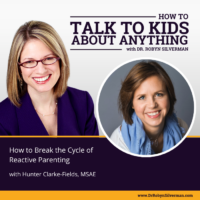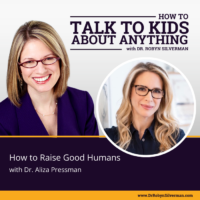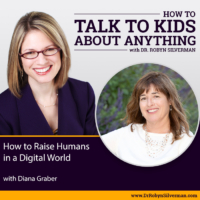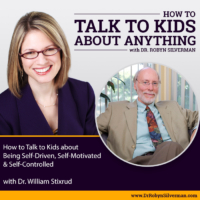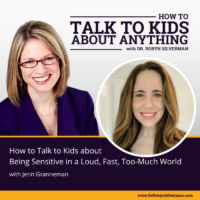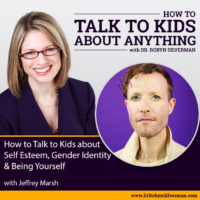Podcast: Play in new window | Download
Subscribe: Apple Podcasts | RSS | More
How to Talk to Kids about Being Good Humans Everyday
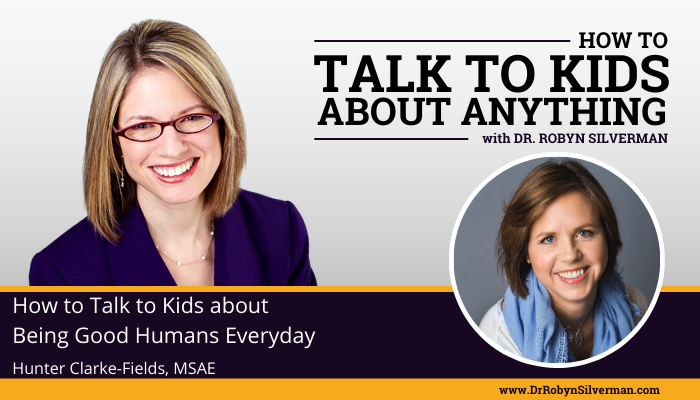
How can we remain mindful when we are rushing around and doing so much as parents? Dr. Robyn Silverman interviews best-selling author, Hunter Clarke Fields, on the How to Talk to Kids about Anything podcast. Hunter’s new book, Raising Good Humans Everyday, is featured
Guest Expert: Hunter Clarke Fields
As parents, we often think about the big things we’ve done with our kids—the trips, the outings, which school we chose, and wonder, have I done enough? But it’s the little things we do each day that really make the difference. While we are rushing around, and express frustration or may yell or melt down ourselves, because we are human—we may need some extra tools to help us parent with intention. And we get to receive those tools today by the amazing Hunter Clarke Fields who is on our show for the second time with her new book, Raising Good Humans Everyday.
Bio
Hunter Clarke-Fields is a Mindfulness Mentor, Mindful Mama Podcast Host, Mom, Global Speaker, and Number 1 Bestselling Author of “Raising Good Humans” with a New Book: “Raising Good Humans Every Day” (Aug 1, 2023). Hunter has over 20 years of experience in meditation and yoga practices, and helps moms bring more calm and family cooperation into their daily lives. She is a Mindfulness Meditation Teacher, the creator of the Mindful Parenting Course and Teacher Training, and has taught mindfulness to thousands worldwide, including a recent trip to Egypt. Hunter presents talks on parenting, is a certified teacher of Parent Effectiveness Training. In addition, Hunter coaches smart, accomplished, over-stressed individuals on how to cultivate mindfulness. Hunter is the mother of two active daughters, who challenge her every day to hone her craft! Her work has appeared in CNBC Make It, Parade, Paleontology, Motherhood Moment, The Hollywood Digest, along with on ABC Portland, NBC Milwaukee, and CBS South Bend, Kansas Public Radio, and many podcasts. And as part of her self-care, Hunter likes to do Scottish country dancing. Learn more about Hunter at https://MindfulMamaMentor.com
Important Message:
- MINDFULNESS: Mindfulness is a parental brain hack that we’re not utilizing to the degree that we can. Mindfulness is kind of like the non-reactive muscle. It’s like going to the gym of your mind to be less reactive!
- WHO: It’s utilized by surgeons, active-duty military personnel, people in prisons and CEOs, people with very high stress environments for a reason because it really helps us to learn to calm or regulate ourselves in a high stress environment and be able to tolerate some of the challenges and difficulties of a high stress environment.
- WHAT IT DOES: It helps us with the sensations and feelings in our body.
- NOT ON AUTOPILOT: Normal to react on autopilot. Our stress response system is finally honed by millennia to keep us safe and alive, but is not so helpful and a lot of times in parenting when we want to actually slow down and use our whole brain. and, you know,
- MINDFULNESS PRACTICE: Mindfulness practice in brain scans show that it actually makes the prefrontal cortex, which is the area involved with executive function, impulse control, problem solving ability, verbal ability, all the things we need to parent.
- BRAIN SCANS: Mindfulness makes the prefrontal cortex thicker and stronger. And makes the amygdala, which are these two little almond shaped clusters in our brainstem that are our, like, “oh crap” centers of the brain, the centers of our fight flight or freeze stress response, and makes them shrink- connectivity between the amygdala and the rest of the nervous system shrink as well. So it’s literally reshaping the brain..
- PROCESS: I’m sitting there and all kinds of normal stuff is coming up. I have an idea, I think of things I need to do later, or maybe some, I sense some anxiety arising. I notice all kinds of things and I just practice sitting with it and observing it. So then when you get to a moment where your kid is freaking out and you have developed a little bit of that muscle of just observing and noticing and being able to be in your body and therefore also be in your whole brain. And that is why I think it’s like the most powerful brain hack that we need for parenting.
- BEGINNING: Takes practice! Realize after a while, it has impacted her whole life. Makes more time in your life.
- There’s something there. Like you could go to the bathroom in the morning and then sit in the bathroom, set a timer for two minutes and that would actually have a pretty profound effect on your life.
- LITTLE KIDS: “Hey, we can do some, some special time. I’m gonna set a timer for 10 minutes. You’ve got my full attention, we’re just not gonna do screens.” And then you practice.
- BREATH: Like when I’m practicing sitting meditation, for me it’s mindfulness of the breath. You’re putting your attention on something. And so in this case, you’re putting your attention on your child with an attitude of kindness and curiosity, right? You get distracted, you bring your attention back to your child, you practice being really being there. And that’s little kids just going to soak that up and it’s like just putting all these deposits in their relationship bank account.
- TEEN: It’s the same with a teenager. It’s basically the same thing. It’s just now you have to think about a teenager’s schedule.
- THOUGHT: I’m having the thought. It’s like we’re stepping out in front of the waterfall and looking at it, and when we get this perspective, then we can decide, is this helpful? Is this not helpful? And it’s so helpful to do this because our thoughts are just thoughts. They’re images and words in our head. They are not reality, right?
- ROBYN: When someone has a negative thoughts about themselves and they tell themselves, I am ugly, I am lazy, all those different things that they can look at the thought and otherwise it mm-hmm. Right? Asking them whose voice is that, who’s actually saying that?
- ZEN MASTER: Zen master, Tik Han, he taught to imagine yourself holding your difficult feelings in your arms like a baby.. Like you’re just holding it in front of you and it’s this like kind of a caring thing, but it’s like, oh, I see you. Then it also puts us in the place of the observer. Of the thoughts rather than in the waterfall.
- MEMORIES: How did your parents react when you were a kid? Impacts our current stress reaction. TRIGGER.
- TRIGGER: Stop. “I see you there and you feel like a child that no one listened to again, and this is your stuff, right?” And then we can start to take responsibility for it and say, oh, this is my thing and I need a minute. And most of the time, 99% of the time we can take a moment and say, whew, I’m getting feeling triggered. We could use that word if we want. I’m feeling frustrated, I’m feeling overwhelmed. WI need a minute. And then start to take a minute to regulate and think through and use again the whole brain so we don’t act on autopilot.
- No Mud, no Lotus. The analogy is that the lotus flower, which is the beautiful flower symbol of enlightenment, has to be rooted down and go through the nasty black muck on the bottom of the pond to be able to grow and bloom into a beautiful flower. (vegetables and our beautiful flowers in our garden. They need compost, which is poop and rotten, nasty vegetables)
- COUNTERINTUITIVE: Teen years- = it’s an incredibly hard time. We want our kids to have more independence. That’s true. Like they should be able to, you know, like go wander around the town, get some groceries by themselves, But I don’t think that necessarily we should be stepping back. We actually want to step into the relationship. We want to be there. I think for our teens, you know, our teens, like you said, bigger kids, bigger problems. Same is happening in my life and in my, with my kids, bigger kids, bigger problems. And they really need our influence in those years. And they’ll accept our influence more when we are not using as much power over them.
- HOLD BOUNDARIES: It’s good for us to hold boundaries. But not punish. Punishment is like something that’s meant to make them feel bad or suffer right in some way. What our kids need as teens is they need us to step in to be really put deposits into that relationship bank account. To be in relationship with them, to be on their team, on their side.
- TOOL: A practice that comes from the Plum Village community of Tek Nhan of beginning anew. And it can be a conversation, it can be a letter. FIRST PART: where you start out with, you maybe write to your teen and you tell them everything you appreciate about them, you water their flower, you write what you appreciate, all the things you appreciate about them. SECOND PART: You share your own regrets. You allow yourself to be vulnerable, to open up and be human. THIRD PART: And then in the third part, this is where you can talk about your hurts and difficulties of what’s maybe happening in the relationship without exaggerating or being accusatory. Then really listen to them, really hear what they have to say and really, really take care of yourself.
- QUESTIONS: Can I be open to what is here right now? Can I be curious?
Notable Quotables:
- “Mindfulness is a parental brain hack. It’s kind of like the non-reactive muscle– like going to the gym for your mind so it’s less reactive in high stress environments!”
- “Mindfulness is literally reshaping the brain.”
- “When I’m practicing mindfulness, I’m sitting there and all kinds of normal stuff is coming up. I have an idea, I think of things I need to do later, or I sense some anxiety arising. I notice all kinds of things and I just practice sitting with it and observing it. So then when you get to a moment where your kid is freaking out, you have developed a little bit of that muscle of just observing and noticing and being able to be in your body and therefore also be in your whole brain. And that is why I think mindfulness is the most powerful brain hack that we need for parenting.”
- “If you don’t have time for mindfulness practice, the thing about it makes more time in your life. As we start to single task and focus and we’ve learned to focus our attention, we get things done more efficiently because we’re more focused.”
- When you’re practicing mindfulness with your child, you’re putting your attention on your child with an attitude of kindness and curiosity. You get distracted, you bring your attention back to your child. You practice really being there. And little kids are just going to soak that up and it’s like just putting all these deposits in their relationship bank account.”
- When we are having thoughts while meditating, I say to myself, ‘I’m having the thought.” It’s like we’re stepping out in front of the waterfall and looking at it, and when we get this perspective, then we can decide, is this helpful? Is this not helpful? And it’s so helpful to do this because our thoughts are just thoughts. They’re images and words in our head. They are not reality, right?
- “When we feel triggered, we can stop and say; “I see you there and you feel like a child that no one listened to again.” And then we can start to take responsibility for it and say, ‘oh, this is my thing and I need a minute. I’m feeling triggered…frustrated…overwhelmed.’ And then start to take a minute to regulate and think through and use the whole brain so we don’t act on autopilot.”
- No Mud, no Lotus. “The analogy is that the lotus flower, which is the beautiful flower symbol of enlightenment, has to be rooted down and go through the nasty black muck on the bottom of the pond to be able to grow and bloom into a beautiful flower. And just like that, we need our difficulties. We need to mess up, we need to be human in order to grow that flower of compassion, of understanding in us.”
- The teen years are incredibly hard years. We want our kids to have more independence. Yes. But I don’t think that necessarily we should be stepping back. We actually want to step into the relationship. We want to be there.
Resources:
- Book: Raising Good Humans Everyday https://www.amazon.com/dp/1648481426/
- Website: MindfulMamaMentor.com
- Previous Book: Raising Good Humans https://www.amazon.com/Raising-Good-Humans-Parenting-Confident/dp/1684033888/
- Facebook: @MindfulMamaMentor. https://www.facebook.com/mindfulmamamentor
- Twitter @HClarkeFields
- IG: @mindfulmamamentor https://www.instagram.com/mindfulmamamentor/
The post How to Talk to Kids about Being Good Humans Everyday with Hunter Clarke Fields appeared first on drrobynsilverman.com.

